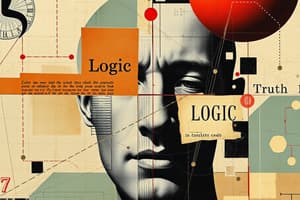Podcast
Questions and Answers
Which of the following is NOT one of the three laws of thought described by Aristotle?
Which of the following is NOT one of the three laws of thought described by Aristotle?
- Law of Non-Contradiction
- Law of Identity
- Law of Excluded Middle
- Law of Causality (correct)
What type of argument relies on general principles to reach a specific conclusion?
What type of argument relies on general principles to reach a specific conclusion?
- Deductive (correct)
- Inductive
- Disjunctive
- Categorical
Which ethical theory emphasizes the maximization of overall happiness and well-being?
Which ethical theory emphasizes the maximization of overall happiness and well-being?
- Existentialism
- Utilitarianism (correct)
- Egoism
- Categorical imperative
What concept does Sartre's statement 'existence precedes essence' relate to?
What concept does Sartre's statement 'existence precedes essence' relate to?
Which argument for God's existence is based on the idea that the universe must have a cause?
Which argument for God's existence is based on the idea that the universe must have a cause?
What type of determinism argues that human actions are completely determined by prior causes and there is no free will?
What type of determinism argues that human actions are completely determined by prior causes and there is no free will?
Flashcards are hidden until you start studying
Study Notes
Laws of Thought and Arguments
- Aristotle's laws of thought include the law of identity, the law of non-contradiction, and the law of excluded middle.
Argument Types
- A deductive argument relies on general principles to reach a specific conclusion.
Ethical Theories
- Utilitarianism emphasizes the maximization of overall happiness and well-being.
Existentialism
- Sartre's statement 'existence precedes essence' relates to the concept of existentialism, which emphasizes individual freedom and choice.
Cosmological Argument
- The cosmological argument for God's existence is based on the idea that the universe must have a cause.
Determinism
- Hard determinism argues that human actions are completely determined by prior causes and there is no free will.
Studying That Suits You
Use AI to generate personalized quizzes and flashcards to suit your learning preferences.




